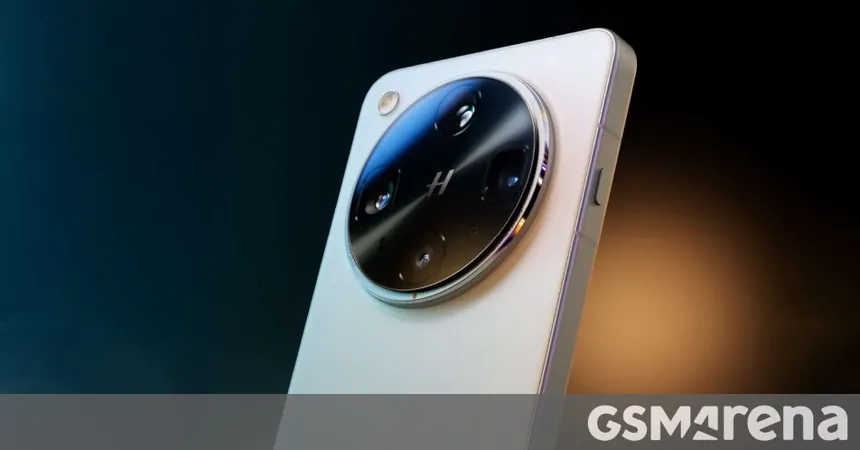
The Symbiosis of Tech and Wellness in 2025: Are We Truly Going to Benefit?
2025-01-05
Author: Sarah
As we hurtle into 2025, health technology is evolving at an unprecedented pace, promising unprecedented insights into our physical well-being. But with such advancements, a pressing question remains: Are we genuinely leveraging this technology for our benefit, or are we merely skimming the surface?
The rise of consumer-centric health devices—think smartwatches and smart rings—has revolutionized personal health monitoring, refining our understanding of bodily functions like never before. In an exciting development from 2024, continuous glucose monitors have become available to individuals without diabetes, offering a deeper dive into metabolic health—a critical, yet often overlooked metric for many Americans.
However, as we stock our digital carts with shiny gadgets and health apps, we must ask ourselves: Are these tools genuinely improving our well-being, or are they distracting us from the essential truths about our health? The increasing reliance on technology can obscure our understanding of health issues.
Dr. Dave Rabin, a neuroscientist and psychiatrist with two decades of experience investigating chronic stress, advocates for a more profound exploration of our health problems. He argues that many health issues stem from unprocessed trauma, which often goes unattended in the hustle of modern life. Rabin warns that the current tech landscape doesn't necessarily promote greater awareness of our emotional and physical states. Instead, it can add layers to our stress response, driving us away from introspection and deeper healing.
As we gear up for a healthier future in 2025, we should consider whether our devices are enhancing our lives or distracting us from urgent inner work. The crucial shift will be focusing not just on what health tech can do but on how to effectively incorporate it into our lives for genuine well-being.
Key Healthy Trends to Watch for in 2025
1. **Healthy Aging and Brain Welfare**: The concept of "healthy aging" is capturing attention, focusing not solely on longevity but on maintaining quality of life. In 2025, expect to see innovations in brain health tech. Research indicates promising correlations between how we interact with our devices and early signs of neurocognitive decline, including dementia. Innovations such as the RealVision app, developed by researchers at Dartmouth, use eye movement tracking to potentially enable early dementia detection. However, Dr. Daniel Friedman reminds us that focusing on modifiable health factors and staying active is equally crucial for brain health.
2. **Nutritional Advances: Food as Medicine**: The "food-as-medicine" movement gained momentum in 2024, and it shows no signs of slowing. Upcoming dietary guidelines will emphasize plant-based proteins and nutrient-rich foods while pushing back against the consumption of processed products. Interest in gut health continues to rise, with research linking the microbiome to various health outcomes. As Federica Amati from ZOE points out, understanding the connection between our diet and gut health is more critical than ever, especially given ongoing research linking certain gut bacteria with increased health risks.
3. **Holistic Health Approaches**: Future advancements may pave the way for innovative devices that offer closed-loop feedback on our health. This means we'll soon have technology that learns and adapts to our unique health signatures, potentially integrating biometric data, mental state, and personalized health guidance.
4. **Mindful Tech Usage**: Psychological insights shared by Dr. Ryan Sultan highlight the importance of evaluating how technology impacts our wellness. The proliferation of notifications can act as a double-edged sword. As such, a more mindful approach to technology use, avoiding overwhelming alerts, could be key to mental well-being.
In our full-throttle world of health tech, it's clear that innovation is on the rise. Nonetheless, it's critical to remember that technology is not a panacea. Health remains a deeply personal journey, shaped by individual needs and experiences. As we embrace advancements, we must also cultivate selective engagement—focusing on what truly resonates with our physical and emotional health, ensuring we embark on a path to real, meaningful wellness.
In summary, 2025 holds the promise of groundbreaking wellness technology, but we must wield it with intention, ensuring it serves our humanity rather than complicating it. Are you ready to take charge of your health in this evolving landscape? It's time to ask the right questions and find answers that empower you!



 Brasil (PT)
Brasil (PT)
 Canada (EN)
Canada (EN)
 Chile (ES)
Chile (ES)
 Česko (CS)
Česko (CS)
 대한민국 (KO)
대한민국 (KO)
 España (ES)
España (ES)
 France (FR)
France (FR)
 Hong Kong (EN)
Hong Kong (EN)
 Italia (IT)
Italia (IT)
 日本 (JA)
日本 (JA)
 Magyarország (HU)
Magyarország (HU)
 Norge (NO)
Norge (NO)
 Polska (PL)
Polska (PL)
 Schweiz (DE)
Schweiz (DE)
 Singapore (EN)
Singapore (EN)
 Sverige (SV)
Sverige (SV)
 Suomi (FI)
Suomi (FI)
 Türkiye (TR)
Türkiye (TR)
 الإمارات العربية المتحدة (AR)
الإمارات العربية المتحدة (AR)